Water from the Blue Ridge hasn’t won any contests—yet.

Illustration by Christoph Hitz
For more than 400 million years, the mighty Blue Ridge has towered above the land, all the while collecting beneath it ancient waters as pure and delicious as the Cambrian explosion period from which it once flowed. Now, for the first time, this life-giving liquid—rich in healing minerals from the fossilized reproductive organs of trilobites—can be yours. Introducing my very own brand: Nelson Toothsome Artesian Primordial Goodness Eternal Life Water.
Our artesian well water here at the base of the Blue Ridge actually smells like rotten eggs, tastes like rust, has the mouth feel of oysters, turns the toilet bowls umber, and makes washed clothes smell like unwashed jockstraps. But, no matter, because the most important thing I have learned about bottled water is this: In most cases, selling water is 10 percent about having good water and 90 percent about having good water marketing.
That there exists in our discourse a “first thing I learned about bottled water” should be explained. I’ve been investigating the finer things water-wise because I was recently asked to be a preliminary-round judge in the 28th Annual Berkeley Springs International Water Tasting competition just across the border from us in northeastern West Virginia.
Learning that there was such a contest and knowing that my own Virginia water is barely potable, I wanted to find out if there were any world-class waters coming out of Virginia. When I looked at the list of contest winners over the last quarter century, I noticed right away—where are the Virginia waters? What’s wrong with our water?
“First off, that’s not accurate,” event organizer Jill Klein Rone says. “There’s one from Virginia that’s won a silver and bronze medal. Shenandoah Valley water. It’s wonderful. Virginia has done just fine.”
The water she refers to is from Edinburg and called—without hyperbole—Virginia’s Best. It comes from a well drilled 400 feet down into the Shenandoah Valley on land owned by the food distribution company Wholesome Foods.
Nathan Pence, the company’s part owner and general manager, will explain a little later why his water is extraordinary and why he’s somehow not getting rich from its extraordinariness.
But first, to distinguish good water from bad, Arthur von Wiesenberger, the Berkeley Springs event’s “watermaster” (a clearly made-up title for his job of training preliminary-round judges) explains, “You first look for the absence of certain things. No turbidity, no aroma, perfectly clear.
“But if it’s only the absence of those qualities, then the water just tastes bland like distilled water. The next step is to figure out what it has that makes it special. Roll it over the palate. Make sure all the taste buds are involved.”
Sometimes it’s sweet, sometimes it’s salty. Some waters make your mouth feel slightly dry, some, obviously, do the opposite.
Both the great ones and the terrible ones take something from their environment that makes them different. “You can almost taste the granite” in one water from Maine, von Wiesenberger says. Another water from a well near a silica mine close to Berkeley Springs feels “slippery.” Another water tastes “lactic.” “Some waters feel like saliva,” he says, a comment which, sort of ironically, made me gag hard enough that my mouth filled with such.
But less exotic locales also do well if the conditions are just right. Waters from the Berkeley Springs area have won. Waters from the Appalachian Mountains have won numerous medals over the years. Von Wiesenberger and other experts consider gold-medal-winner English Mountain Spring Water from mountainous eastern Tennessee one of the very best in the world.
So back to Edinburg, home of the Pence family’s Virginia’s Best, where the water “is never touched by human hands and never stripped of its naturally-occurring minerals,” Nathan Pence explains. “It has the perfect pH balance, good alkalinity. It has some sodium and calcium—everything your body needs. It’s like God put all this stuff in the water.”
So Pence wins the gold medal for pastoral water poetry. Combined with water that actually merits effervescent prose and you’d think he’d be bathing in water riches. He’s not: After the Berkeley Springs win, Virginia’s Best saw only a modest 15 to 20 percent bump in sales.
The reality of bottled water sales is that it’s not really about how good your water is. “It’s about money and shelf space and marketing,” says Pence. “We had it in Walmart, but we couldn’t raise our price to make the numbers work. We got into Whole Foods, but we could only get on the bottom shelf.
“You try to go into convenience stores and Coke owns all the coolers,” he continues. “It’s tough. Many big bottlers are just putting tap water in a bottle, but it doesn’t matter. Size wins.”
Which gave me hope. I may have terrible water and an idiotic sales pitch, but no matter. If I can find a few million bucks for marketing, I’ll surely strike it rich.
This article originally appeared in our October 2017 issue.








